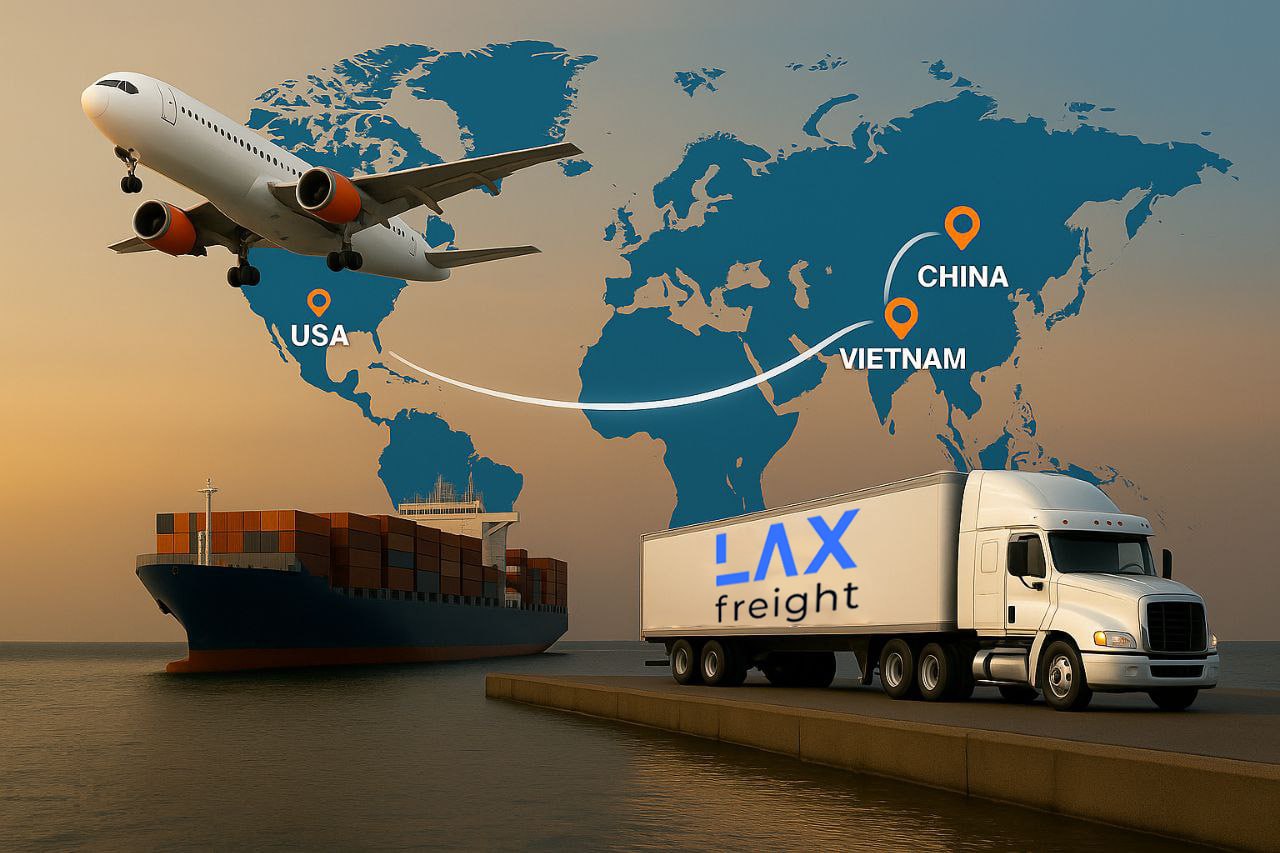Nowadays, the rapidly changing market makes supply chain management pivotal for the overall success of any business. This is particularly important for retail operations. As customers expect fast and reliable services, retailers face the challenge of maintaining efficient and responsive supply chains.
The ability to manage the goods flow with precision can impact a retailer’s profitability and customer satisfaction.
Retailers must navigate a complex sourcing, inventory management, and transportation web.
All these factors can impact competitiveness and income. Understanding the requirements for effective supply chain management and being aware of the current market trends are essential for those who aim to succeed.
What is Retail Supply Chain Management?
Retail supply chain management foresees managing goods flow from suppliers to retailers and customers. This includes such stages, as raw materials purchase, production, warehousing, transportation, and final delivery to the customer.
The main aim of the retail supply chain is to ensure that products are available in the correct quantity, at the right time, and in the right place.
A comprehensive and reliable retail supply chain management ensures sufficient inventory levels, preventing overstocking or stockouts.
This balancing requires advanced forecasting techniques and close cooperation with suppliers for timely replenishment.
Another significant aspect of retail supply chain management is transportation. Efficient delivery methods ensure timely transportation of goods from suppliers to distribution centers, retail locations, or directly to the customer. Retailers can avoid delays in their supply chain through effective transportation management, routes and fuel consumption optimization, and reduced shipping times. This can reduce delivery costs and enhance retailers’ reputation for reliability.
Nowadays, retailers often use advanced software solutions to enhance supply chain processes. For instance, these technologies can help monitor inventory levels, manage orders, and communicate with suppliers. Predictive analytics can forecast demand accurately, while automation tools streamline repetitive tasks, such as reordering inventory. The technologies allow greater visibility into every stage of the retail supply chain.
Retailers can increase their competitiveness and ensure success in a fast-paced market by focusing on the key aspects of the retail supply chain, from inventory control to leveraging innovative technologies.
The Importance of Effective Supply Chain Management in Retail
Effective supply chain management in retail industry is essential for the success and profitability of a business. However, customers are obtaining more choices that leads to higher consumer expectations. This requires efficient solutions and technology usage in managing the retail supply chain.
The main aspect of the importance of effective retail supply chain management is its impact on costs, as every step of the supply chain requires costs. Thus, poor management can lead to inefficiencies, such as excess inventory, transportation delays, and miscommunication with suppliers. All these can increase expenses. At the same time, a well-managed supply chain can reduce operational costs, optimize inventory levels, enhance transportation processes, and increase customer satisfaction.
Inventory management is a critical aspect of the supply chain that impacts its effectiveness and operational costs. Balancing supply and demand requires thorough planning and careful forecast analysis. Excessive inventory can increase storing costs, while too little inventory leads to stockouts and missed sales opportunities.
Customer satisfaction is another reason why retail supply chain management is important. The customer experience is based on such factors as the availability of products, delivery time, communication with a retailer, and the overall experience during purchase and order placement. If a customer can’t find the desired item or faces delivery delays, it can lead to dissatisfaction and loss of a client. Retailers can ensure better customer experience and repeat business with supply chain optimization.
For customer satisfaction, the speed and efficiency of the retail supply chain are important. In today’s market, consumer expectations are based on the immediacy of online shopping and fast delivery services. This requires retailers to respond quickly to changes in demand, which can be caused by seasonal trends, promotions, or unexpected shifts.
Retailers can use advanced technologies, such as real-time tracking, predictive analytics, and AI tools, for more effective supply chain management in retail industry. This can help identify potential issues or bottlenecks, predict market trends, and make informed decisions on supply chain management.
Risk management is another aspect of effective retail supply chain management. The global nature of supply chains means a wide range of risks. Effective supply chain management includes identifying these risks, assessing their impact, and developing response plans.
Sustainability is another important aspect of retail supply chain management that influences customer experience. Clients become more aware of the environmental impact of their purchases, requiring producers and retailers to act responsibly. Effective supply chain management helps reduce the carbon footprint by optimizing routes, sourcing sustainable materials, and minimizing waste.
Key Components of Retail Supply Chain Management
Managing the retail supply chain is a complex process with several critical stages. Each of them plays a crucial role in ensuring a smooth product flow. Understanding these key components can help simplify supply chain management and enhance customer satisfaction.
Sourcing and procurement
This is a fundamental aspect of the retail supply chain. It involves identifying and selecting reliable suppliers of the necessary goods. Effective sourcing foresees a comprehensive approach to supplier selection. In particular, it should include evaluating suppliers’ reliability, financial stability, production capabilities, and adherence to ethical and sustainable standsrds.
Procurement activities also include negotiating prices, managing supplier performance, and coordinating order placement and delivery schedules.
Inventory management
Effective inventory management requires demand forecasting, stock control, and inventory optimization. For instance, accurate forecasting helps retailers plan inventory levels and avoid overstocking or stockouts.
It requires a comprehensive analysis of historical sales data, market trends, and seasonal variations. Then, monitoring and controlling inventory levels ensure that products are available when they needed. This includes reorder schedule, safety stock levels, and use of just-in-time inventory solutions. In addition, retailers can use various tools and strategies to optimize their inventory management. Thus, ABC analysis categorizes inventory on the basis of value and importance.
Warehousing and storage
This stage foresees the management of facilities where the goods are kept before their delivery to retail locations or customers. At this stage, retailers can benefit from such aspects as space optimization and inventory handling. The first aspect can ensure maximized space utilization, facilitating efficient storage and retrieval of products.
Inventory handling includes the use of technologies, such as automated storage and retrieval systems (AS/RS) and conveyor systems to enhance efficiency of receiving, storing, picking, packing, and shipping processes. In addition, retailers should ensure that warehousing operations comply with safeguard regulations and standards. This can include proper handling of hazardous materials or high-valued items.
Transportation and logistics
Effective transportation and logistics management are essential for meeting customers’ expectations, reducing delivery times, and controlling shipping costs. Usually, this involves routes optimization through selecting the most suitable transportation modes and routes based on product type, delivery speed, and cost considerations. Partnering with transportation providers and negotiating contracts for reliable and cost-effective delivery can also provide more effective retail supply chain processes.
Demand forecasting
It’s the process of analyzing customer behavior to estimate future demand for specific goods. Accurate demand forecasting requires inventory planning to determine how much inventory is necessary to meet demand, reducing overstocking or stockouts. Supply chain oordination is also important for that, ensuring the availability of the products and their timely delivery. Retailers use different solutions to predict demand, including statistical models, AI tools, and market research.
Supplier relations management
Supplier relationship management (SRM) foresees establishing and maintaining strong relationships with suppliers that provides a reliable flow of goods. Its key aspects include supplier performance monitoring, based on criteria such as quality, delivery reliability, and responsiveness. Collaborative relationships can also lead to better pricing, improved product quality, and enhanced supply chain efficiency.
Customer relationship management (CRM)
This aspect focuses on understanding and meeting customer needs. Its key elements include customer data collection, client preferences, purchase behavior, and feedback. It allows to gain insights into their expectations and needs. CRM data also helps personalize product offerings, marking campaigns, and customer interactions. Effective CRM ensures increased customer loyalty and satisfaction, which can lead to repeat business.
Returns management or reverse logistics
This stage involves handling the return of the goods from customers. This can be based on improper quality of the product or damage during transportation. Key components of reverse logistics include managing the process of receiving, inspections, and processing returned products. This foresees assessing the condition of items and determine their further disposition, such as restocking or recycling. Reverse logistics foresees cost management for a range of processes, including transportation, handling, and restocking.
Retailers should also provide clear instruction and support for customers with return policies and tracking information.
Challenges in Retail Supply Chain Management
Retail supply chain management involves a range of challenges that impact a supply chain operations and ability to satisfy customer demand. This can be resulted from suh issues as market volatility, globalization, high customer expectation, regulatory compliance, and logistical challenges.
Retailers should implement a strategic and flexible approach to address these problems. In addition, the use of innovative technologies can be useful. This should include supply chain optimization and practices to meet the demands of the modern market.
Demand volatility and forecasting
This is one of the most significant challenges of retail supply chain. Various factors can affect consumer demand, including seasonality, economic conditions, trends, promotions, and unexpected events. Thus, accurate forecasting is essential to manage inventory levels and meet customer expectations. Otherwise, retailers can face stockouts or overstocking. Both cases lead to financial losses through increased inventory holding costs or loss of sales opportunities.
Supply chain disruptions
This is another major challenge in the retail industry. The disruptions can be caused by a wide range of factors, such as natural disasters, competitiveness, strikes, or supplier bankruptcies. This can further lead to delays, increased costs, and the complete breakdown of supply chain processes in severe cases.
Retailers often source products or materials from different parts of the worlds that increases these risks. Avoiding the hazards requires careful planning of supplies, inventory management, diversifying suppliers, and developing alternative sourcing and transportation strategies.
Inventory management
In the retail sector, managing inventory can be complex amid the vast number of products, changing demand patterns, and multiple sales channels. In addition, customer expect a seamless shopping experience that adds another layer of complexity to inventory management.
Retailers must maintain optimal stock levels to ensure the needed quantity of products are available when needed. This requires balancing inventory across several locations, such as stores, distribution centers, and e-commerce fulfillment centers. Overstocking in one location and stockouts in another can lead to increased costs and lost sales.
Transportation challenges
Transportation and logistics are critical aspects of the retail supply chain. Still, they involve a set of challenges, such as fuel prices, driver shortages, regulatory changes, and infrastructure constraints. All this can impact the cost and reliability of shipping.
Retailers should cooperate with reliable carriers to ensure timely and efficient delivery. Collaboration with reliable drivers can provide route optimization and lower fuel costs. Retailers must also manage the challenges of last-mile delivery, the most expensive part of transportation. This involves the load delivery from distribution center to customers. This can be complicate in populated urban areas or remote locations.
Regulatory compliance
Retailers must adhere to numerous laws and regulations that refer to different supply chain processes. This can include requirements on product safety, labor practices, environmental standards, and data protection.
Regulatory compliance can be more difficult if a retailer has global supply chains and must adhere to requirements set by different jurisditiocs. Non-compliance can result in legal penalties, fines, and reputational damage.
Strategies to Improve Retail Supply Chain Management
Retail supply chain management requires a multifaceted approach that includes several aspects and ensure efficient processes. this includes forecasting, inventory management, relations with suppliers, technology integration, and logistics optimization. With reliable strategies, retailers can optimize their supply chain and reduce operational costs.
Enhance demand forecasting. Retailers can use advanced analytics and real-time data integrations for better demand forecasting. Tools like big data analytics, machine learning algorithms, and AI technologies allows historical sales data, market trends, and external factors analysi. This provides more accurate demand forecast. In addition, leveraging real-time data from point-of-sale (POS) systems or e-commerce platforms helps adjust forecast on the basis of current customer behavior and market conditions.
More accurate demand forecasts can help match supply with demand, reducing costs and ensuring product availability.
Optimize inventory management. Effective inventory processes are important for meeting consumer demand. In particular, retailer can use Just-in-Time (JIT) inventory, reeiving goods for further production or sale only when needed.
However, it requires close collaboration with suppliers and reliable logistics processes. the other solution foresees the utilization of software solutions that offer real-time visibility of inventory levels, automated reordering, and predictive analytics.
Optimized inventory operations can reduce costs, improve cash flow, and ensure the availability of needed goods.
Maintaining strong supplier relationships. Strong cooperation with suppliers is essential for efficient retail supply chain. This can also lead to better pricing, improved product quality, and reliable deliveries. Retailers should regularly evaluate supplier performance, including deliver reliability, quality, and responsiveness. The other reliable solution is to diversify the supplier base, reducing dependence on a single supplier or region.
Improve transportation efficiency. Logistics are crucial for any supply chain, helping minimize costs and meeting delivery requirements. The basic strategy for improving transportation is route optimization. It can be reached through GPS technologies and advanced algorithms that optimize routes and reduce fuel consumption, transit times, and transportation costs. The other solution is cooperation with third-party logistics (3PL) providers. They can provide their expertise and infrastructure to manage complex logistics.
Retailers sometimes also use a multimodal transportation strategy. This foresees the use of several transportation modes to balance costs and delivery speed.
Develop risk management strategies. Retailers should establish responsive plans to address possible disruptions of the supply chain promptly. This increases the resilience of the operations and minimizes the disruptions’ impact on operations. The strategy foresees developing alternative transportation routes, identifying potential bottlenecks across the supply chain, and investing in comprehensive insurance coverage.
The Future of Retail Supply Chain Management
The supply chain in retail can undergo significant changes in the future. This may involve technological advancements, consumer demands, and the need for sustainability.
As AI and machine learning develop, they can provide enhanced decision-making, more precise demand forecasting, and potential for streamlined operations. In addition, AI-based tools can provide personalized solutions, from product recommendations to automated support through chatbots. Retailers will rely on these solutions for inventory and sales management to ensure a seamless customer experience.
The other future aspect is the continuous rise of e-commerce and the demand for omnichannel experiences. Amid this, retailers can rethink their supply chain strategies. Managing inventory across several sales channels requires comprehensive and reliable solutions that can ensure seamless integration. Future innovations may include solutions for quick, reliable, and flexible shopping experiences.
Blockchain technologies are also expected to become a cornerstone of a retail supply chain management. They offer greater transparency, allowing to track products from their origin to the point of sale. This prevents fraud hazards and provides more secure and efficient transaction with suppliers.
The future of retail supply chain will also see an increased use of advanced robotics and automation at the warehouses. These technologies can enhance efficiency, accuracy, and speed of processes, such as sorting, picking, packing, and inventory. Some companies already use autonomus mobile robots (AMRs) and automated guided vehicles (AGVs) to move goods with reduced manual labor.
Conclusion
The current competitive retail market makes the supply chain management more crucial than ever. The evolving market requires advanced technologies usage, optimized logistics, and enhanced customer experience. Thus, retailers should focus on key aspects, such as demand forecasting, inventory management, and efficient transportation.
If you seek to improve your supply chain management and maintain competitiveness, consider partnering with 3PL logistics companies. LAX Freight offers comprehensive retail supply chain management services. We aim to optimize your logistics, enhance efficiency, and ensure reliable delivery process.
Explore how LAX Freight can support your business and increase your earnings. Contact us today to start the path to more success!



